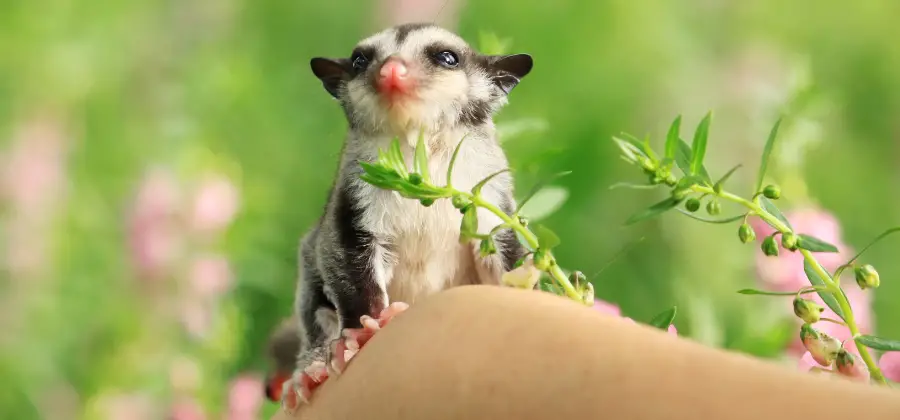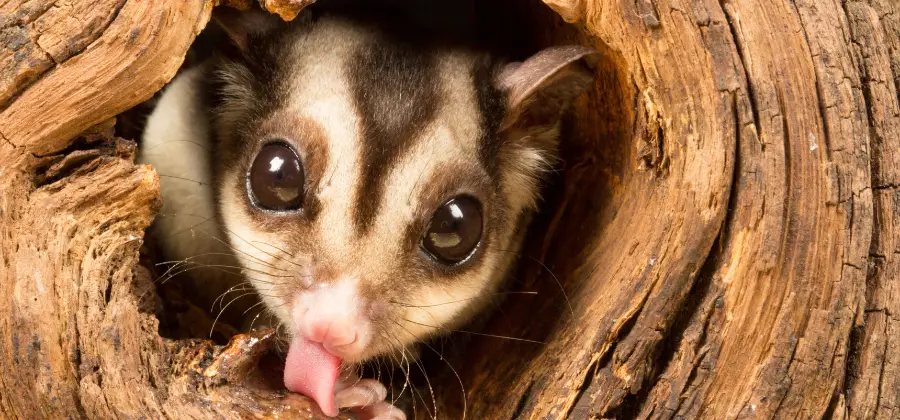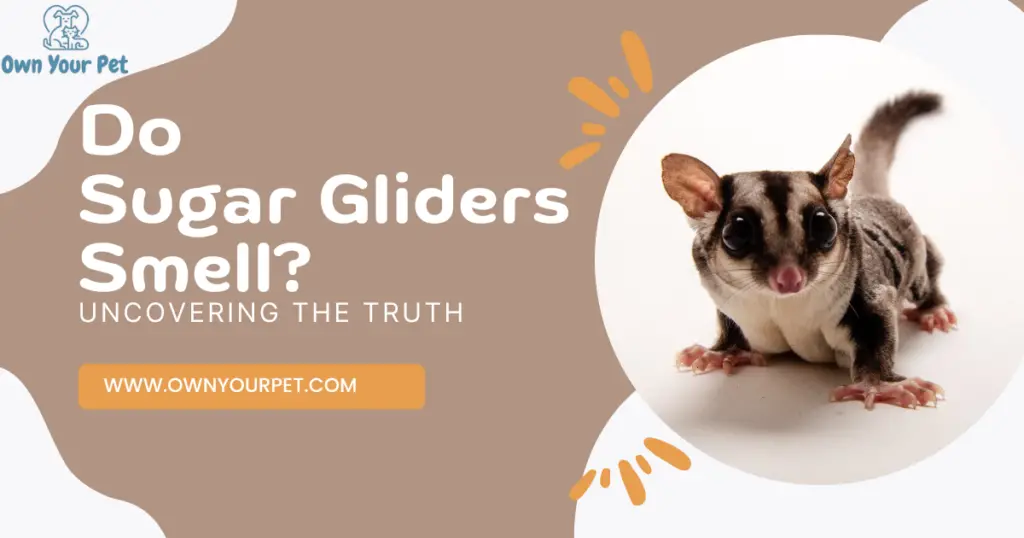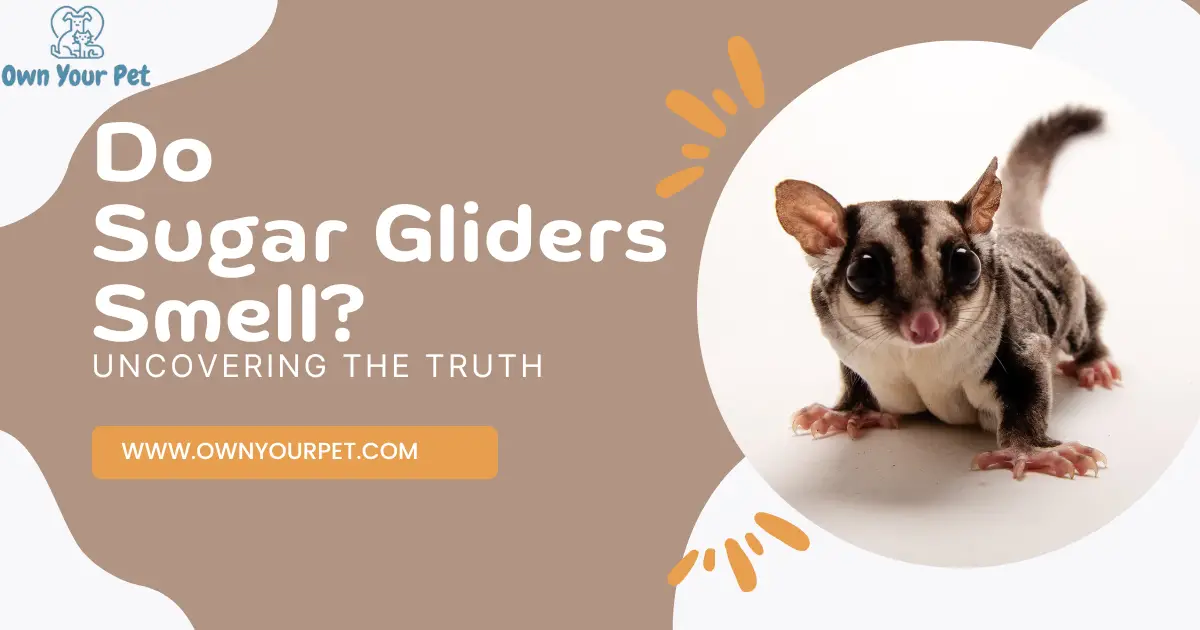Do Sugar Gliders Smell? It’s a question that many potential owners ponder before welcoming these adorable creatures into their homes. In this informative guide, we delve into the topic and separate fact from fiction.
Join us as we uncover the truth about Sugar Gliders and their potential scent, shedding light on the factors that may contribute to any perceived odor. Get ready to explore the fascinating world of Sugar Gliders and discover the truth behind their scent.
Do Sugar Gliders Smell? Uncovering the Truth

Sugar gliders are adorable and unique pets known for their playful nature and gliding ability. However, potential owners may wonder if these charming creatures come with an unpleasant smell. While sugar gliders do have their own natural scent, it has been described as neither unpleasant nor overly strong.
Nevertheless, understanding their smell and how to manage it is essential for maintaining a clean and happy environment for your pet.
These small marsupials are known to emit a sweet scent, but they can also produce a pungent pet odor on occasion. Differentiating between the normal scents and potentially problematic odors is essential for keeping your sugar gliders healthy and comfortable.
Ensuring cleanliness in their cage through regular maintenance, such as cleaning the feeding bowls, getting rid of food leftovers, and replacing water, is crucial in controlling foul smells and keeping your pet’s habitat enjoyable.
Additionally, it is essential to consider advice from those with firsthand experience with sugar gliders. While some people might encounter a musty or foul fragrance issue, others can have their pets with minimal or enjoyable musk.
Factors such as male sugar gliders smelling stronger than females or a developing infant sugar glider’s digestive system affecting their odor should be considered before welcoming these delightful pets into your life.
Why Do Sugar Gliders Smell?

Natural Smell
Sugar gliders are unique animals, and like all creatures, they possess their own distinct smell. Owners commonly report that their sugar gliders’ natural smell is not unpleasant but rather mild and tolerable.
However, keep in mind that some individuals might be more sensitive to smells than others so personal experiences may vary.
Infant sugar gliders may give off the scent of urine and feces as their digestive systems develop; nevertheless, maintaining a regular cleaning schedule for their living spaces prevents unpleasant odors from becoming too powerful. Litter training your sugar glider can also help with keeping foul smells at bay.
Scent Glands
In addition to their natural smell, sugar gliders have scent glands that produce specific odors.
The male sugar gliders have a stronger smell than their female counterparts due to the presence of musk-producing scent glands located on their forehead, chest, and around their genitals. The males use these glands to mark their territory and establish dominance.
Here are a few key points about sugar gliders and their scent glands:
- Musk-producing glands: Male sugar gliders possess these glands which are responsible for the stronger scent.
- Territorial marking: Scent glands are used as a way for sugar gliders to mark their territories, especially in the case of males.
- Dominance establishment: Males use the scent produced by these glands to establish dominance within their colony.
Although sugar gliders produce different smells due to various factors, most of the odors can be managed and minimized.
Maintaining a clean living space for your sugar glider, addressing their diet, and training them to use a litter box can significantly decrease the intensity of the smells and make your sugar glider’s environment pleasant for both you and your furry friend.
Factors Influencing Smell

Diet
The diet of a sugar glider plays a crucial role in determining their smell. Sugar gliders require a balanced diet consisting of fruits, vegetables, insects, and protein sources to stay healthy and maintain proper nutrition.
An incorrect diet can lead to digestive issues, diarrhea, and an unpleasant odor emanating from their waste. Providing them with appropriate food will ensure that any bad smells are minimized.
It’s important to avoid feeding your sugar glider a poor diet, which may include excessive amounts of protein, meat, or eggs, as this can result in strong odors. To maintain a healthy diet, provide fresh fruits and vegetables, along with protein sources like insects.
Health
The health of your sugar glider is another factor that can affect their smell. Health issues such as stress, digestive problems, or infections can lead to an increase in odor. It’s essential to monitor your pet’s well-being and address any health concerns promptly.
A veterinarian should be consulted if you suspect any health issues with your sugar glider. Keeping your pet healthy will help reduce foul odor and ensure a happier living environment for both you and your sugar glider.
Territory Marking
Sugar gliders, like other animals, have scent glands on their chest area. They use these glands for territory marking, which can contribute to a musky odor around their living space. Male sugar gliders tend to mark their territory more frequently than females, making their scent stronger and more noticeable.
Neutering male sugar gliders can help to reduce territorial scent marking, and ultimately, decrease the odor. Ensuring that their cage is regularly cleaned and that bedding, toys, and other items are replaced will also contribute to a fresher, cleaner living environment for your sugar glider.
Proper cage maintenance includes steps such as:
- Cleaning the feeding bowls, eliminating leftovers, and providing fresh water daily.
- Cleaning the cage with hot water and soap, removing waste, and sterilizing items every few months.
Implementing a consistent cleaning schedule will prevent the buildup of urine, feces, and other waste materials that contribute to unpleasant smells. In addition, litter training your sugar glider can help manage waste and reduce odor.
Watch: Dealing w/ Smelly & Messy Sugar Gliders
Cleaning and Maintenance
Cleaning the Cage
To keep your sugar glider’s habitat clean and odor-free, it’s important to clean the cage properly and not too often. Over-cleaning can actually encourage sugar gliders to mark their territory more, so it’s recommended to clean their cage every two weeks.
You can use a mix of vinegar and hot water to clean the cage thoroughly. When washing your sugar glider’s toys, pouches, and other items, make sure not to wash them all at once. Leaving something with your sugar glider’s scent in the cage can prevent them from over-marking.
Litter Training
Litter training is a useful way to maintain cleanliness and reduce foul smells. Sugar gliders may defecate in specific areas of their habitat, so setting up a litter box with pine pellets in that area can be helpful.
Consistently using positive reinforcement and patience can train your sugar glider to use the litter box, making it easier to manage their waste and keep their environment clean.
Neutering Male Sugar Gliders
Neutering male sugar gliders can help reduce the musky odor they produce during the breeding season. They produce a stronger scent for communication and bonding, which can contribute to the overall smell of their habitat.
Neutering can also prevent any unwanted reproduction and make your sugar glider a more docile and well-behaved pet.
In addition to the above steps, you can also consider using an air purifier to keep the room smelling fresh. Feeding your sugar gliders a balanced diet of pellet food, fresh fruits, and insects like crickets can also promote their overall health and hygiene.
Make sure to regularly check and replace the fleece bedding in your sugar glider’s habitat to maintain cleanliness as well. By following these proper cleaning and maintenance techniques, you can create a healthy, clean, and comfortable environment so both you and your sugar gliders can enjoy each other’s company without unpleasant odors.
Do Sugar Gliders have a distinct odor?
Sugar Gliders do have a natural scent, but it is typically not overpowering or unpleasant. Their odor is influenced by factors such as diet, hygiene, and overall health. With proper care, a clean living environment, and a balanced diet, any scent can be minimal and manageable.
Preventing and Reducing Odors

Proper Nutrition
A well-balanced diet plays a significant role in preventing unpleasant smells from your sugar glider. Ensure that your glider’s diet consists of approximately 50% pellets, 25% fresh fruit and vegetables, and 25% protein.
Maintaining a healthy calcium-to-phosphorus ratio in their diet is also essential. The sudden introduction of new food or feeding spoiled food can cause diarrhea, leading to foul odors. Offer your sugar glider fresh fruits like strawberries as treats to promote their health and well-being.
Good Ventilation
Proper ventilation is crucial in controlling and reducing odors in your sugar glider’s environment. Improving airflow in their living space helps dissipate any scents and maintains a fresh, healthy environment for your pet.
Make sure the cage is placed in a well-ventilated area and, if possible, use a cage with wired sides to allow for better airflow.
Regular Cage Cleaning
To keep unpleasant smells at bay, regular cage cleaning is a must. Here are some steps for maintaining your sugar glider’s cage:
- Daily maintenance: Clean feeding bowls, remove food leftovers, and replace water with fresh water. Wipe any mess around the cage using a vinegar solution, which helps neutralize odors.
- Weekly cleaning: Remove and wash all cage accessories, toys, and bedding. This prevents the buildup of bacteria and odors.
- Deep cleaning: Every 3 months, give the cage a thorough cleaning with hot water, soap, and a small amount of bleach to eliminate odor-causing bacteria.
By providing proper nutrition, ensuring good ventilation, and maintaining regular cage cleanings, you can effectively prevent and reduce odors from your sugar glider, making their living environment pleasant and healthy.

